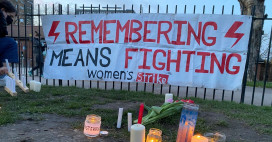
On this page
Over 20 years ago – in July 2001 – an anti-globalisation activist, Vincenzo Vecchi, took part in a demonstration against the G8 Summit in Genoa, Italy. Eighteen years later, he would be arrested in France on the basis of a European Arrest Warrant issued by Italy and begin a long legal battle that is centred around a law passed during Mussolini’s rule. The case not only has implications for the right to protest in Italy but also for how justice is delivered between European states. In July 2022, the Court of Justice of the European Union passed a ruling prioritising ‘mutual trust’ over justice, with serious consequences for fundamental rights across Europe.
What was Vincenzo Vecchi accused of?
Vincenzo Vecchi was accused of “devastation and looting” in Italy, an offence which originates from a law implemented under Mussolini’s fascist regime. The original purpose of the law was to prevent opposition to the dictatorship by repressing protest. The law can be used to criminalise the right to demonstration – being at a protest and just in the vicinity of people who commit an offence such as criminal damage can be considered “moral support”, carrying a penalty of between eight and fifteen years imprisonment. People can be therefore charged for offences even though they had no involvement.
Vecchi faces 12 years in prison for alleged material offences, including those committed by others around him in the 2001 demonstration, based on photos that only show his presence at the demonstrations.
The use of this law is a threat to the right to protest in Italy but Vecchi’s case has consequences beyond Italy.
Where was Vecchi arrested?
Vecchi had been living in France for years when he was arrested in 2019. The Italian authorities issued a European Arrest Warrant (EAW) against him, requesting his surrender by France (the executing State) to Italy to serve a sentence of 12 years and six months that was handed down in 2009. EAWs were originally designed to help fight serious cross-border crime by making it easier to extradite someone from one EU state to another but they are in practice used for all kinds of offences (mainly theft and criminal damage according to EU figures).
Under the principle of ‘double criminality’, a State can refuse to surrender a person under an EAW when the acts for which the person is wanted do not constitute a criminal offence in the State in which they are present. Two French Courts of Appeal refused to surrender Vecchi to Italy for this reason. In France, some of the acts that Vecchi was convicted for were not unlawful. But this was not the end of the case, which continues to this day: over twenty years after the demonstration.
Ruling of the CJEU
The French Supreme Court referred the case to the Court of Justice of the European Union (CJEU), asking for an interpretation of the EAW Framework Decision, specifically on the principle of double criminality and whether the principle of proportionality (art 49(3) of the Charter) required the executing State to refuse the execution of the EAW.
In a decision in July 2022, the CJEU ruled that Mussolini’s “devastation and looting” law did not need strict equivalence with a French offence. It also considered that it was not up to the executing State to assess the proportionality of the sentence. The Court further justified its decision by the principle of ‘mutual trust’ which is a necessary condition to achieve the objective of accelerated surrender between judicial authorities in the EU.
The decision of the CJEU reduces the EAW procedure to an automatic administrative process, depriving judges of the power to control respect for the person’s fundamental rights. The Support Committee for Vincenzo Vecchi has highlighted that this decision undermines fundamental rights in that it:
- Allows for a sentence which is disproportionate to the facts.
- Removes the scope of the principle of double criminality.
- Assimilates the crime of “devastation and looting” in Italy (with a sentence of 8-15 years imprisonment) with the crime in France of “degradation of property”, which carries a much weaker sentence.
- Implies that Vecchi be extradited to Italy 21 years after the alleged crime.
- Allows the implementation of a draconian law repressing the right to protest.
A final decision will be made by the French Supreme Court on 11 October 2022.
For more information see:
- Comité de soutien à Vincenzo Vecchi website
- Vincenzo Vecchi, enjeu malgré lui de la Justice européenne in Le Soir by Véronique Lamquin
- « Dans l’affaire Vincenzo Vecchi, la Cour de cassation est notre dernier rempart pour la défense des libertés publiques » in Le Monde
- Mandat d’arrêt européen contre l’italien Vincenzo Vecchi: «Ça serait donc ça, nos valeurs?» in La Libération


